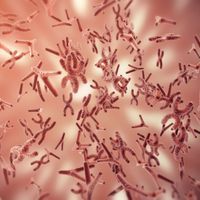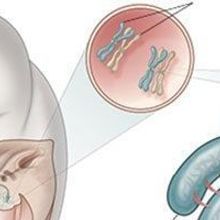aneuploidy

Genotyping Made Easy with Automation
Integra Biosciences | Aug 30, 2022 | 1 min read
A pipetting robot assists multi-well sample loading in genotyping assays.

How Chaos in Chromosomes Helps Drive Cancer Spread
Samuel F. Bakhoum | Mar 1, 2022 | 10+ min read
A new link between inflammation and rampant chromosomal abnormalities reveals novel strategies to treat diverse malignancies.

Infographic: Chromosome Errors Cause Micronuclei and Drive Cancer
Samuel F. Bakhoum | Mar 1, 2022 | 2 min read
When micronuclei rupture, chromosomes break, recombine, and form circles, causing inflammation and promoting carcinogenic growth.

The Scientist Speaks - Homing in on New Anticancer Targets
Sejal Davla, PhD | Sep 28, 2021 | 1 min read
Jason Sheltzer discusses cancer mechanisms leading to drug resistance and new approaches to find drug targets.

Optical Genome Mapping Works Well in Detecting Cancer Risk
Marcus A. Banks | Jul 22, 2021 | 3 min read
The relatively new technique for visually detecting chromosomal variants associated with disease risk performs at least as well as more established techniques in two recent studies.

Cell Biologist Angelika Amon Dies at 53
Max Kozlov | Nov 4, 2020 | 3 min read
A “larger than life personality,” Amon devoted her career to studying the cell cycle and aneuploidy. Her research has shaped the field of cancer biology.

Aneuploidy Could Explain Variability in Female Fertility: Study
Catherine Offord | Jan 13, 2020 | 2 min read
Eggs from girls and from older women show higher rates of errors in chromosome number.

Unbalanced Chromosomal Inheritance More Common than Thought
Jef Akst | Oct 11, 2019 | 2 min read
A genomic analysis from 23andMe suggests that people inherit two copies of a chromosome from only one parent nearly twice as often as researchers had realized.

Breakthrough Prizes Recognize Aneuploidy Researcher, Biochemist
Catherine Offord | Oct 18, 2018 | 2 min read
This year’s winners also include the developers of nusinersen, an oligonucleotide therapeutic for spinal muscular atrophy.

Chromosomal Instability Drives Cancer Metastasis
Jim Daley | Apr 1, 2018 | 2 min read
In the presence of cytosolic DNA, cancer cells activate antiviral pathways that disguise them as immune cells.

Infographic: How Escaped Chromosomes Can Aid Metastasis
Jim Daley | Mar 31, 2018 | 1 min read
Errors in segregation during cell division can lead to inflammation in daughter cells.

Scientists Destroy Entire Chromosome with CRISPR
Kerry Grens | Aug 1, 2017 | 1 min read
Multiple DNA breaks at either the centromere or the long arm of the mouse Y chromosome cause it to fragment and disappear.

Transparency Now
Mary Beth Aberlin | May 1, 2016 | 2 min read
Science is messy. So lay it out, warts and all.

Picturing Inheritance, 1916
Amanda B. Keener | May 1, 2016 | 3 min read
This year marks the centennial of Calvin Bridges’s description of nondisjunction as proof that chromosomes are vehicles for inheritance.

Aneuploid Responses
Catherine Offord | May 1, 2016 | 2 min read
A recent exchange of papers is divided over the evidence for compensatory gene expression among wild strains of aneuploid yeast.

Contributors
Catherine Offord and Kerry Grens | May 1, 2016 | 3 min read
Meet some of the people featured in the May 2016 issue of The Scientist.

A Scrambled Mess
Karen Schindler | May 1, 2016 | 10+ min read
Why do so many human eggs have the wrong number of chromosomes?

Meiotic Mysteries
Karen Schindler | Apr 30, 2016 | 2 min read
Understanding why so many human oocytes contain the wrong number of chromosomes

AACR Q&A: Angelika Amon
The Scientist | Apr 19, 2016 | 3 min read
The aneuploidy expert shares what she has learned at the American Association for Cancer Research annual meeting.
